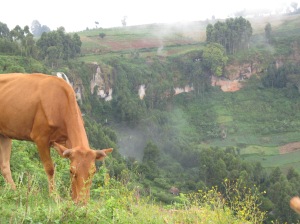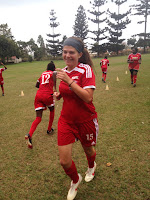A year and a half ago, after founding and directing the Uganda Studies Program for ten years, Mark and Abby Bartels moved back to the US with their kids. As we just completed our fall 2015 semester's Debrief and Re-entry Seminar, we asked Mark and Abby to share a bit about what their re-entry process has been like. How have they have endeavored to integrate their experiences, beliefs and convictions into a way of life and being in the US?
 |
| Daniel, Mark, Abby, Mary and Rachel Bartels At Grayson Highlands State Park in Virginia. |
1. What and why? Mark: vocation---
why we moved back, a desire to serve and invest in UCU as an institution and
desire to create space/opportunity for Abby and I to share workload and have
time and opportunity to be part of the formation of our children as they go
through adolescence.
The decision to leave USP and Uganda was a difficult one.
There were so many things we liked about our work and life in Uganda. In the
end, there were three significant factors. The first is that we felt, for a
variety of reasons, that we wanted our kids to experience some of their growing
up years in their home culture. A big part of that was the fact finding a good
schooling option for our kids was becoming increasingly difficult in Uganda.
The second factor leading to our moving from Uganda was, ironically, the
opportunity to continue to work with Uganda Christian University (UCU). We felt
that this continued connection to UCU was an important part of our
“integration” as we moved back. What better way to continue to process and
think about our life in Uganda than to have a continued formal connection? The
third factor was the reality that although Abby was involved with USP, being in
Uganda did not allow her to explore her professional and personal development
goals in the same way being in the U.S. would.
In some ways, we can look back at our transition and see
each of these three factors playing a key role in our (relatively) positive
re-entry. While we aren’t living in exactly the type of community we may have
envisioned upon leaving Uganda, we are in a place that is working well for the
kids. From school to activities to friends, the kids are all engaging their
new/home culture in positive ways. The work with Uganda Christian University
Partners is providing us a key connection to UCU and connecting our current
life stage with our previous one. Not only has Abby been able to consider and
explore more professional options since we have been back, but her current
focus is on coordinating communications for Uganda Christian University
Partners—something that utilizes her strengths and keeps her engaged with our
time in Uganda.
2. How? Abby speaking for both of us from here on out!
I think about our USP alumni and community all the time as
we continue to “debrief” our “re-entry” with ourselves, with you, with friends
who were in Uganda with us and with others who face transition and an earnest
desire to be pilgrims!
 |
| Photo of Mark 'debriefing' the kids: I think they love it as much as you all did! |
We are doing our best to try to wade through all the commitments
of our lives with the orientation of “patience/presence” because it is the
piece from our time in Uganda that is most universally challenging to our
American culture and most life-giving to us as people and to our family life.
I’m adding a link to an OnBeing podcast of a poet, John O'Donohue, who has a Celtic view of life
and the inner landscape. He beautifully describes a quality of life and “presence” that we can cultivate in
our inner beings regardless of our place, our culture, our circumstances. I find it comforting and inspiring.
I recently read that C.S. Lewis said all great truths are a
paradox. I do think there probably is a
paradox involved with the competing cultural values—productivity/efficiency/stewardship
versus presence, patience, kairos
time (kairos being the quality of
time, chronos being the quantity of
time). It is a paradox that most
Americans and Westerners face while being in Uganda; it is a paradox worth
embracing!
Almost a year and a half into our move back, I’m compelled
by developing routines and rituals that would encourage us to be
present/patient, because I don’t trust the worlds’ patterns or my natural
emotions (as aided by technology and consumer culture!) to seek and submit to patience/presence.
By the end of our time in Uganda, Mark started reading books
by James K.A. Smith and I think he has another way of asking, “What is forming
you?” He talks about liturgy (for you
non-Anglicans; remember learning about liturgy while studying at an Anglican
University in Africa?) in a bigger picture sense exploring the ways we have
many “liturgies” in culture, in our routines, in our way of life that are
training us to love the wrong things. Here is a Christianity Today article reviewing his work.
While I’ve been somewhat general in the motivations and the
measures of how we are seeking to be present, I would say it really does affect
many of our decisions and schedules.
From our finances (choosing to live with my folks), to schooling for the
kids, to what activities they do, to how we do church, to how we make time for
our marriage, to carving out personal space and goals, to investing in
friendships (near and far), to food choices (a work in progress), to our
consumerism, to our time at work and our time off, etc.
One example that I’m still mulling over—Sabbath. For the last several months, I have been
compelled by the thought of doing Sabbath well. I haven’t worked out what that means yet, but it is percolating in my
mind and spirit as a way to counter our culture and embrace a presence that is
abiding and deep and good for our souls!
So, if you are wondering if the Bartels have transitioned
well… I think I can mostly say, “we’re working on it!” And we’re grateful for all the years of being
immersed in a very present culture that has enabled us to imagine another way,
enabled us to pause and consider our patterns and “liturgies of life”!
 |
| Marks parents visiting us in Pittsburgh where we live with Abby's parents. |
 |
| The attic space is our living room— that is a batting net for wiffle ball, my office desk, a very heavy TV, etc. Sometimes, the close quarters get intense for the introvert mother of the family! |
 |
| Outdoor time is good for the soul, and the swings remind the kids of Uganda! |
 |
| Living with my folks is overall good; but sometimes we need our own time and space: a weekend in a cabin! |
If you want to follow the goings on at UCU and the work that Mark and Abby are doing through Uganda Partners' (UCU's US-based support agency) you can join the mailing list to receive newsletters about Uganda Christian University. You can also *like* the UCU Partners Facebook page!























































